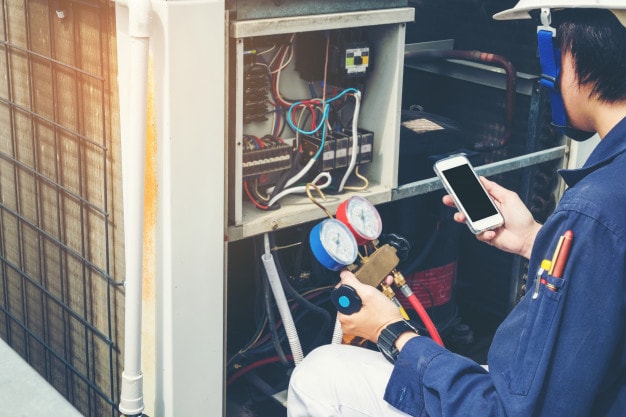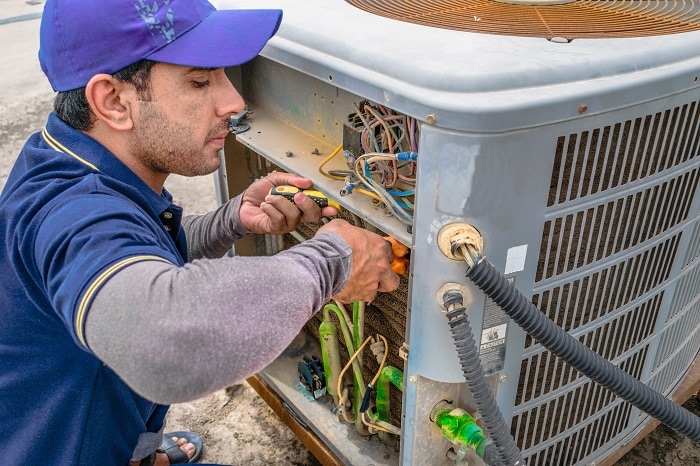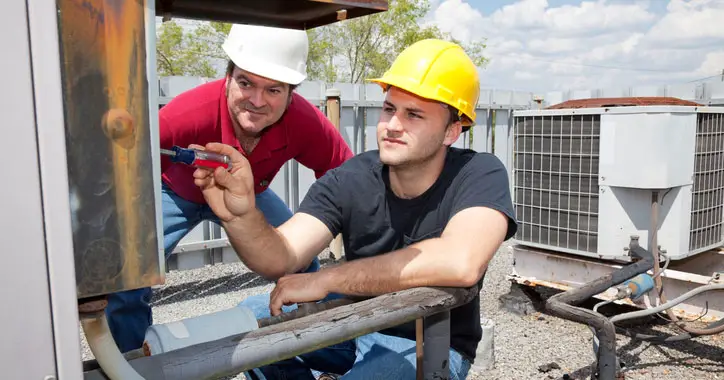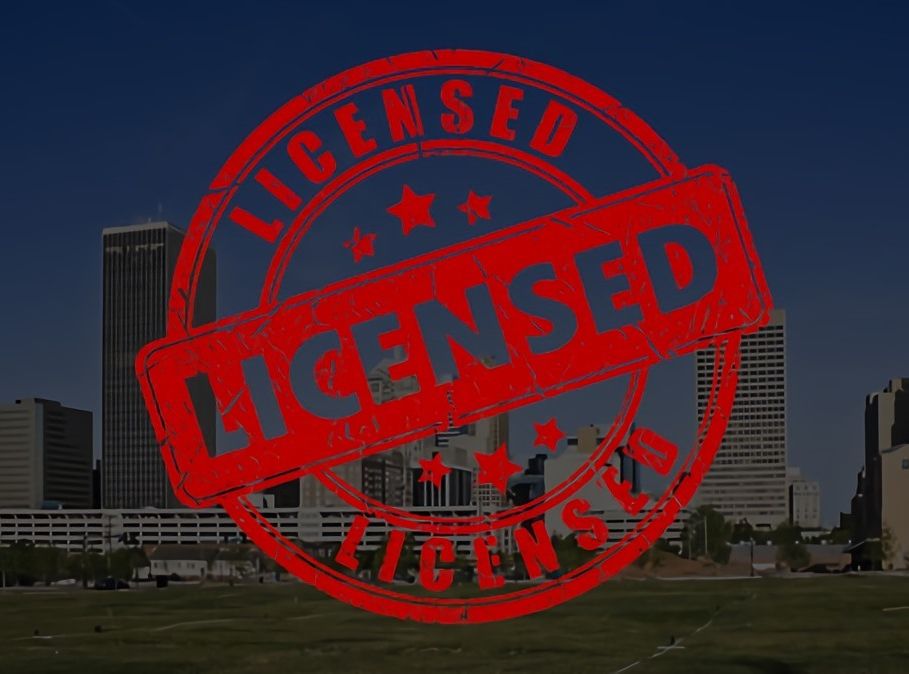Working in North Carolina as a refrigeration or HVAC technician offers great opportunities and rewards. Regarded as one of the best states to work in as an HVAC technician, North Carolina is an attractive destination for technicians and engineers from out of state and others looking to join the trade. Like most states in the country, North Carolina requires HVAC and refrigeration technicians to be state certified before undertaking work.

You must sit and pass the Refrigeration Contractor’s Exam. On passing the exam, you will receive the Refrigeration Contractor License which enables you to practice your trade. This article guides you through the certification process and covers the:
- Eligibility requirements
- Application process
- Preparing for the exam
- Taking the exam and what happens after
At the bottom you will also find reference to some recommended HVAC training facilities within the state.
Heating and Cooling Licensing in North Carolina
North Carolina separates heating and cooling contractors from refrigeration for licensing purposes. There are three groups of heating and cooling license:
H1 – “Wet” or “water-based” comfort heating systems in any building (residential, commercial, industrial). This is divided into Class 1 which can service any building, and Class 2, which is limited to single-family detached dwellings.
H2 – This group is for forced air heating and cooling for units of over 15 tons.
H3 – This group is for forced air heating and cooling for units under 15 tons. Class 1 is for any building, and Class 2 is for single-family detached dwellings.

Under each of these groups, there is also a “T” designation, or a technician. A technician is not a contractor but must be a sublicensee of a contractor. It’s written H1-T, H2-T, H3-T.
There is also for each group an “SGLT” designation, which is for employees of state and local governments. Again, this is not a contractor license. The designation is written SGLT-H1, etc.
Eligibility Requirements for the Heating Exams
To take the contractor exam for any class, the candidate needs to meet these requirements:
- 2 years (4,000 hours) on-site full-time experience in the installation, maintenance, service, or repair of plumbing or heating systems related to the category for which license is sought, whether or not license was required for the work performed.
- However, up to one-half (2,000 hours) (45 quarter hours or 30 semester hours) of the experience requirement may be in academic or technical training directly related to the field of endeavor for which the examination is requested.
A candidate for the technician exam must have 18 months (3,000 hours) on-site full-time experience in the installation, maintenance, service or repair of plumbing or heating systems related to the category for which license is sought, whether or not license was required for the work performed. No mention is made of academic or technical training.

Preparing for the Heating Licensing Exam
The heating part of the exam for either a contractor or a technician is four hours long. A contractor has to take an additional business and law exam of about an hour and a half.
A complete, up-to-date list of study materials for the exam can be found on the state’s licensing website. The book list varies according to the group you’re preparing for.
You can find an application form here as well as up-to-date information about any changes or additional requirements.
Eligibility Requirements for the Refrigeration Contractor’s Exam
If you are an individual working in the refrigeration industry performing installation, maintenance, servicing and repair work on refrigeration equipment and devices, you must be actively registered with the state’s Refrigeration Board. To be able to sit the exam, you will need to meet the following requirements:
- Complete and submit an application form with a non-refundable application fee or examination-license fee.
- Provide evidence that you have completed a minimum of 4000 hours in commercial refrigeration.
Experience is a critical aspect for gaining the contractor license. The experience may take the form of an academic qualification in a field recognized by the board, or technical training or apprenticeship. Only 2000 hours of academic or technical training hours will be accepted as part of the experience eligibility criteria. Any other practical work experience must:
- Have been acquired while working under the supervision of a licensed refrigeration contractor Or
- Be a professional engineer Or
- Holds relevant experience

If you are in doubt about the validity of your experience, please contact the board who may be able to help you determine whether you have the applicable experience to meet the eligibility requirements.
At this time, North Carolina does not have a reciprocity agreement with any other states.
HVAC Schools in North Carolina
If you’re looking to gain academic qualification through an HVAC school then you can find programs that are near you below.
The Application Process
Once you are satisfied you meet the eligibility requirements, the next step is to download and complete the exam application form. To complete the application form, you will need the following details:
- Any history of licensing applications.
- Your educational information if educational or technical training forms part of your eligibility criteria.
- Work experience history including names of employers and dates employed.
- For the practical experience aspect of your eligibility, you will need your current or former supervisor to fill in part of the form and attest to the number of hours completed.
Once you complete the form and have signed it, you can submit the form to the board with the exam-licensing fee.
Preparing for the Refrigeration Contractor Licensing Exam

It is vital that you thoroughly prepare for the exam before sitting to enhance your chances of passing the first time. The exam is split into 4 different parts, and you will be required to achieve passes in all parts to receive your license.
You will have no more than 3 consecutive attempts at passing each part of the exam and all parts have to be passed within a year. Failure to achieve passes in all parts within a year or within 3 tries will mean you have to start the exam all over, even if you have passed some parts of the exam.
The four parts are as follows:
- Part A covers the Law, Administrative Code and Refrigeration Safety. (15 questions)
- Part B tackles equipment, equipment performance, refrigeration theory and electrical aspects. (40 questions)
- Part C covers electrical and mechanical codes. (20 questions)
- Part D includes plans, specifications, and estimating. (25 questions)
Note: This is an open book exam and so you can bring the books you think will help you pass the exam.
If you are applying for transport refrigeration certification, the exam is slightly different and has only three parts with fewer questions than the commercial/industrial refrigeration exam.
Passing the Exam and Receiving Your License
Once you have successfully taken the exam, the State Refrigeration Board will issue you with a Refrigeration Contractors License. Your license will require renewing every year and the board will send you renewal notifications.
If you fail to renew your license, it is an offense to continue working in the industry without a valid license. Also, your license number should appear on all permit applications. You must ensure you meet all the licensing conditions, or you may lose your license or face prosecution.

Practicing as a licensed refrigeration contractor in North Carolina is a legal requirement. Getting certification is easier if you know the requirements and the examination process. This article has shown you what you need to be eligible for taking the exam. The State Board website also contains more detailed information to help you through the application process. There are some companies which will offer support towards earning your certification and they may be worth looking into.
If you have found the information in this article useful, please share it with other technicians and professionals looking to get certified.
Looking for Information on Nearby States?
You might also be interested in HVAC licensing requirements in bordering states:
